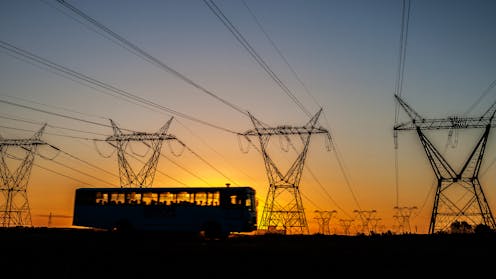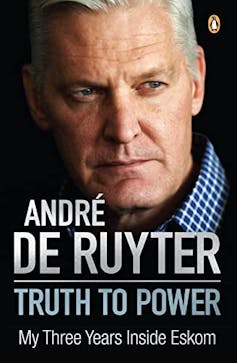
The former chief executive of South Africa’s power utility, Eskom, has written a scathing critique of the ruling party’s practices that have seriously damaged the country’s economy.
Andre de Ruyter’s book Truth to Power is not the first exposé of the country’s political and economic woes under the African National Congress. But it strikes a sensitive chord because of the impact of recurring power cuts on the economy and daily life, a crisis De Ruyter was hired to deal with.
Beyond his description of Eskom’s corruption and ineptitude is a subtler message that is equally disturbing. It’s De Ruyter’s prescription to end the state’s involvement in the economy, which he sees as a major obstacle to economic growth. In its place, he advocates a socially unhinged liberalisation of the economy (p231) in which the market is left to its devices. He observes that:
Wherever governments have allocated resources, it has been an abysmal failure.
What De Ruyter fails to grasp, though, is that what he advocates has been a core part of the ANC’s policies for over 25 years.
My view, based on 30 years of research, writing and teaching the political economy of Africa, is that this would roll back whatever gains have been realised so far in redressing the segregated economy of colonial and apartheid eras. His version of neo-liberalism or unfettered market ideology and policy that emphasises the value of open markets with minimalist state regulations would worsen people’s living conditions.
My current research focuses on the relationship between democracy and development. States can and sometimes do use public policy to – in the words of the late American political economist and scholar Alice H. Amsden – “govern the market”. Botswana’s post-colonial experience, discussed in my 1999 book, is most relevant to South Africa. At independence in 1966, Botswana had little infrastructure and few opportunities. But thanks to its first two presidents, Botswana has achieved a middle income country status as it has grown significantly for the past 50 years.
If the government of South Africa made good use of the state in governing and disciplining the market, it is highly likely that unemployment in the country would not be what it is today. Similarly, if the government of independent Botswana had followed De Ruyter’s prescription, the country would likely have become another basket case.
What South Africa needs is not neo-liberalism, but a new social contract between government, labour and business to create productive jobs and redress social injustices. Such a contract would include concrete milestones on targeted investments in productive sectors. It would demand that labour militancy and disruption meanwhile be kept at the minimum.
De Ruyter’s key claims
De Ruyter identifies four of the major causes of the country’s energy crisis.
First is the deployment of ANC party activists, or cadres, in state-owned enterprises. Many were not only ill-equipped for their jobs but sought to profit from their assignments through irregularities. This created criminal networks that destroyed some national enterprises.
Second is a coalition of actors he calls the “coal mafia” in control of coal supply to Eskom. They exported high quality coal and supplied low grade coal to Eskom. This led to regular collapses of Eskom’s power stations.
Third, he accuses the Minster of Minerals and Energy, Gwede Mantashe, a former leader of the National Union of Mineworkers, of blocking the transition to green energy.
À lire aussi : Corruption in South Africa: former CEO's explosive book exposes how state power utility was destroyed
Fourth, De Ruyter claims the ANC government failed to retain experienced white engineers. The young white and black engineering graduates may be well trained but lack hands-on experience. Eskom was therefore left with a shortage of experienced engineers at a time when it needed them the most.
What is clear from both De Ruyter’s account and the findings of the Zondo Commission into state capture is that the ANC leadership, particularly in the last two decades, sanctioned the abuse of public authority. In fact, some of the leaders flouted the ethical principles of the ANC itself by joining the ultra wealthy as inequality in the country deepened.
Neo-liberalism will not deliver
De Ruyter’s prescribed remedies amount to the repackaging of economic apartheid. The beneficiaries of racist policies and the ANC’s neo-liberalism would be put on steroids. His remedies are based on the policies the World Bank imposed on the rest of Africa in 1981, policies that devastated the continent.

He also blindly condemns the role of government in development (p112) and advocates the privatisation of the energy sector, knowing well that the white business establishment would be the biggest beneficiary of such reforms.
De Ruyter’s dismissal of the role of an activist state in the economy – one that governs the market– ignores the positive economic role of governments in such countries as South Korea, Taiwan and Japan.
Then there is his view about the basic income grant for the poor, a policy which he says will entrench dependency on the state even further (p115).
He forgets that past segregationist policies gave nearly 87% of the land to white South Africans and heavily subsidised their education. They also subjected black workers to white exploitation, laying the foundations of the income and wealth inequality that persists today between whites and blacks.
What went wrong with the ANC government?
Regardless of the weaknesses in De Ruyter’s contentions, the South African government’s record during the past two decades has been dreadful. One of the most precious assets the ANC brought into power in 1994 was the trust of the majority of citizens.
To preserve and reinforce this vital asset required a three-pronged strategy.
First, the state should have been more productively involved in the economy and efforts to eliminate corruption in order to improve social services for the poor majority.
The second task was to revitalise the economy by protecting and reforming old productive industries and investing in new enterprises.
Third, the ANC and its appointees should have been models of integrity in public service.
But successive ANC administrations, particularly since 2004, betrayed the trust of the majority in three ways.
First, the aspiring black elite’s rush to mimic the lifestyle of the former “master” clearly signalled that the liberation mindset essential for reconstruction and development was no longer fashionable.
Second, the government’s unrealistic belief that it could navigate the dominant neo-liberal global economic policies that laid to waste old industries such as textiles, thus preempting the possibility of a developmental state.
Third, the moral decline of the ANC leadership most cruelly exposed by the Marikana massacre and state capture underscored the party’s impotence.
Seeing beyond the nightmare
It is widely acknowledged that neo-liberal policies and corruption are companions in the contemporary developing world. Thus, what South Africa needs is not an extreme version of neo-liberalism, but a new social pact that creates productive jobs and achieves transformative social justice. Only then can South Africa hope for an African renaissance.
Abdi Ismail Samatar ne travaille pas, ne conseille pas, ne possède pas de parts, ne reçoit pas de fonds d'une organisation qui pourrait tirer profit de cet article, et n'a déclaré aucune autre affiliation que son organisme de recherche.
This article was originally published on The Conversation. Read the original article.







